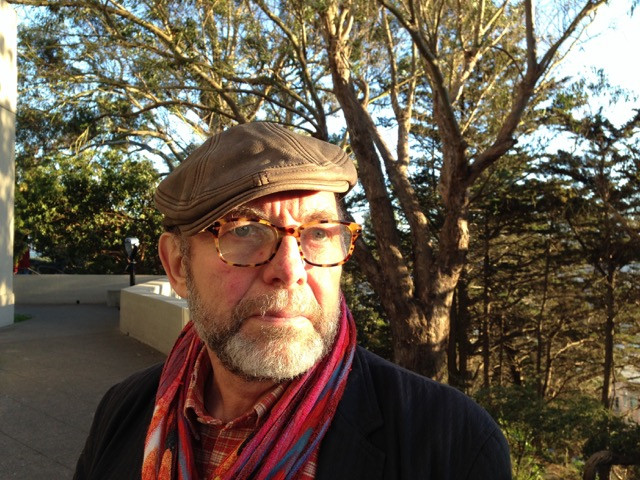Natalie Gerhardstein: Can you sum up in a few sentences what you do for a living?
Pierre Joris: I’m a writer--a poet, to be exact--which means that I’ve had to take any number of different jobs to pay the rent. For a good part of my life, I taught comparative literature, writing, French theory, translation at university. I retired from the State University in New York in Albany about five years ago.
What’s your favourite Luxembourgish word?
A word that comes to mind is Schmier, a buttered bread--a word that any good New Yorker can understand and spells “schmeer”, as it’s basically the same word in Yiddish. As English is, as my father used to say, “merely a dialect of Luxembourgish,” it gives the English language the word “smear”.
Another word that comes to mind is Quidden [quince]. My aunt had a quince tree in her garden in Dudelange and used to make jelly out of it, and it reminds me of an interesting childhood. But on any other day, I might come up with a half of dozen words, orally, that is--remember that I belong to a generation that did not write Luxembourgish.
Why did you leave Luxembourg?
Since we didn't have a university in Luxembourg, I went to Paris to study medicine in 1965. I dropped out and went to study literature in the US in 1967, having decided to become a writer in English. My parents weren’t very happy with me dropping out, but they were good enough to okay my move financially, so I went to Bard College in upstate New York, where my son, as it happens, also graduated two years ago.
When you talk about Luxembourg to non-Luxembourgers, what do they say?
It depends. Some are charmed and astounded at what a weird little place it is. Since it’s often seen as a rich little paradise, sometimes people want to know why I left.
How is Luxembourg viewed where you live? Is its reputation marred in the media?
There’s a marred reputation in terms of the financial shenanigans. It’s basically known on one level as the idyllic grand duchy, so when you are in US it’s seen as a quaint holdover of ancient times with the grand duke and so on. At the same time, it is where the rich go and hide their money. It has those different aspects to it. Travelling around the US, I’ve been to little towns in Iowa originally settled by Luxembourgers. Those are people who have a kind of remembrance--I even heard some of the older generation speaking Luxembourgish. There are many different reactions to the country. Right now among the younger generation--for example, with my kids, who are in film--it’s known as a little centre of movie-making, so it has a cultural flavouring in that sense.
What do you miss about Luxembourg?
I miss the wine a lot, but I stopped drinking five years ago. I miss Kachkéis very much and spent a long time trying to find equivalents, and I found a place in Texas that sold a sort of similar Kachkéis but not as good. I used to bring back Quetsch and Mirabelle from Luxembourg as well.
I miss the landscapes. I like Luxembourg as a city, it’s a very pretty place. Since I don’t have a car, I don’t travel outside the city too much but I try to go to the Éislek [Oesling] at least once and stop in the town in which I grew up from ages 9-19, which is Ettelbruck. I also like to spend a day on the Moselle and walk around. It is a truly beautiful place, with great variations in its landscapes.
When was the last time you were proud of Luxembourg or of being Luxembourgish?
In a sort of negative way, when I was in Paris during the American elections. We woke up in the morning to see that Trump had been elected in the US, and I was so happy I had a Luxembourg passport! Though we returned to New York and became active in the resistance to Trump... I was also proud and pleased to be in Luxembourg last June because I had a play at TNL ["The Agony of Ingeborg Bachmann"], and working with people from all over Europe was a great pleasure. In a way, it made me proud of the country that it had such a multicultural, collaborative setup in the cultural domain.
In 2017, what will you do to ensure that the slogan--Let’s make it happen--will happen?
Obviously, I’m a cultural worker, so I would have more monies flowing towards a range of cultural events in very different, decentralised ways around the country. It seems to me that Luxembourg can be most interesting as a crossroads of cultural movements. This is important to me now on a European level. We’re at a dangerous moment, where nationalistic forces--Brexit, Le Pen, and so on--are very active. If we could go back to what really is one of the core moments of the creation of Europe, which is the first post-war moment of Benelux, and can look at Luxembourg as a very excellent example of a place that is totally willing to be European while keeping whatever little national habits it needs. One should celebrate Luxembourg as exactly the incarnation of those two things: a very strong localism, and a very major European player in the wider sense of things. Of course, one has to be transparent in terms of global finance, but it seems to me that there is the possibility of making Luxembourg shine.
Celebrating Luxembourg
In 2017 Maison Moderne and Nvision celebrate Luxembourg by profiling 100 people who contribute positively to the country’s international reputation and brand image. The series will culminate in a gala evening on 13 December at Luxembourg Congrès. If you know somebody who you think deserves to be on the 100 list, let us know: [email protected].
